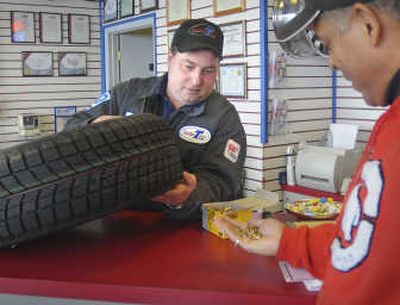Whatever happened to retractable studs? Maybe next winter

Legislators in Washington and Idaho last year passed laws allowing tires with retractable studs for all-season driving.
But no such tires by Q Tires Inc., the Greenville, S.C.-based startup that pushed for the legislation, have hit store shelves or Inland Northwest pavement. While a company lobbyist last spring said Q Tires would be ready this winter, the corporation now projects they will debut this summer.
“We’re in our final stages of evaluation and assessment, where we will hopefully early this spring be producing our first tires,” said CEO Roy Bromfield.
Q Tires bills its tires as an all-weather alternative for people who want safety yearlong and an option that doesn’t tear up highways like studded tires. Montana, Oregon and Nevada have passed similar legislation, making 12 states that allow studded or retractable-studded tires all year, Bromfield said.
“The legislators look at them and say, ‘What’s not to like?’ ” he said.
Manufacturers are turning to alternatives in the face of concerns about studded tires, which the Washington state Department of Transportation says causes all rutting damage on concrete state routes and about 60 percent of damage on asphalt.
Costco earlier this year stopped selling studded tires in a move to be “environmentally responsible.” In November, then-Mayor Dennis Hession declared Spokane would stop using studded tires on its vehicles starting in winter 2008-09.
Prior to the legislation, Idaho law prohibited studs between May 1 and Sept. 30. Washington forbade them between April and November.
“We really don’t want the retailer or the consumer to question: Is this OK or not?” Bromfield said. “It’s the prudent thing to do to have legislation in as many of the states that we can that eliminates that question.”
Metal studs in Q Tires extend and retract when a driver pushes a remote-control button, using air from the tire’s main chamber to inflate secondary pockets that push out the steel nubs. They can cycle about 25 times before drivers need to add air, Bromfield said.
This spring, Idaho lobbyist Jerry Deckard, working on behalf of Q Tires, said, “They’ll have tires in the marketplace for the next winter season.”
But delays associated with building a plant in Qingdao, China, and with testing and additional development slowed release, Bromfield said.
“I think what Jerry probably should have said back then was that the company would hope to have products” for this season, he said.
But the timing of the product’s release wasn’t consequential to the Idaho bill’s sponsor, Sen. Jim Hammond, R-Post Falls.
“The idea was just to provide that opportunity, mainly because I have a concern about what studs do to roads,” he said. “I was going to be surprised if they got them out that soon. That was a pretty aggressive deadline.”
Q Tire prices will vary based on size, but they will be sold “at roughly a 30 percent premium above a high-end, all-season radial,” Bromfield said. He foresees selling them through independent, regional retailers, and the company doesn’t plan to offer them through wholesale clubs.
Bromfield said distribution will begin in the Rocky Mountain and Pacific Northwest regions.
Currently, drivers looking to avoid studs but have added traction may use studless snow tires or chains. Studless snow tires, which have soft rubber cut with grooves to grip snow and ice, generally are “superior to studded snow tires in all snow conditions except for clear ice near freezing temperatures,” the department claims.
Such tires are becoming increasingly popular, said Jeremy Dierks, manager of the downtown Spokane Perfection Tire.
“The scales have tipped in studless tires’ favor,” he said. “They just haven’t become very popular until recent years.”
While studless tires once cost about twice as much as studded ones, he said, prices have become competitive. Four Bridgestone Blizzaks in the most popular size cost about $500 plus tax, while a set of Cooper studded tires in the same size would cost about $530 at Perfection Tire, he said.
Other approaches include tires developed by an Iceland-based company that incorporate hard granules for year-round traction and Toyo tires that include crushed walnut in the rubber.
Q Tires, which employs nine, has received more than $9 million in investment funds, Bromfield said. The company has several Washington-based investors, and the company’s founder is from Portland, Ore., he said.